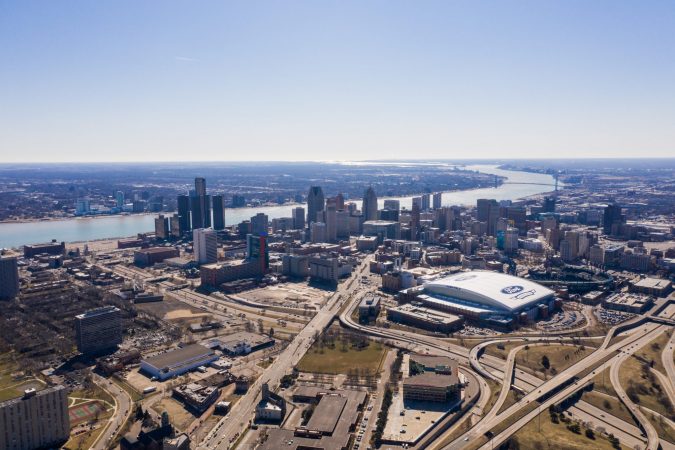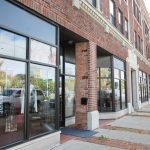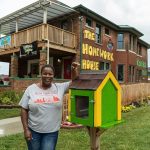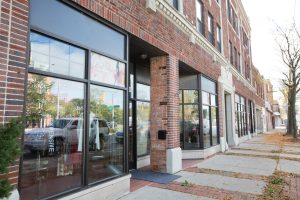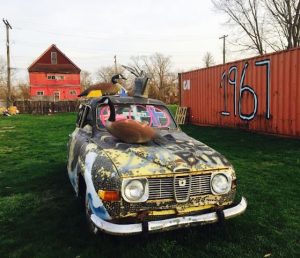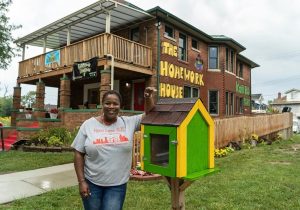Detroitisit, in partnership with the Consulate General of the Kingdom of the Netherlands in Chicago, and the Embassy of the Kingdom of the Netherlands in Washington DC will host the Sustainable Urban Design Summit in an effort to develop creative solutions through a global yet hyperlocal virtual program in partnership with and during the globally recognized Dutch Design Week.
Simon Sylvester-Chaudhuri, Founder and Executive Director of CIV:LAB a 501(c)(3) nonprofit based in New York, Detroit, and London and also the Co-Founder of Detroit Urban Solutions, focusing on cross-sector collaboration toward innovation in urban areas, will share examples and scaled solutions during the Summit.
Join us for a fresh discussion between Dutch and Michigan based progressive leaders working to apply sustainable urban design and circular economy applications in architecture, design, policy, development, mobility, materials sourcing, and re-thinking how cities, citizens in them, their social cohesion, and the buildings that occupy space coexist.
Hear Simon‘s perspective on the topics on October 21st, 2021. The Sustainable Urban Design Summit will take place virtually over Zoom on October 21st at 9:30 am EST and 15:30 CET simultaneously.
Register for your FREE space to attend the Summit on Zoom here: sustainableurbandesignsummit.com
Simon Sylvester-Chaudhuri is the Founder and Executive Director of CIV:LAB a 501(c)(3) nonprofit

SIMON SYLVESTER-CHAUDHURI
based in Detroit, New York, and London whose focus is connecting ecosystems locally and globally to catalyze local innovation.
In partnership with TechTown Detroit and Wayne State University, in 2020 he co-founded ‘Detroit Urban Solutions,’ a Detroit urban tech collaborative of 30+ organizations working together toward driving the advancement of sustainability in the city.
He teaches Global Entrepreneurship at the NYU Center for Global Affairs and on the Future of Cities at Imperial College Business School London, and previously helped build the Urban Future Lab at NYU and Global Futures Group where he worked as an advisor on global cities to the International Trade Administration and U.S. Commerce under Secretary Pritzker.
Leading into his involvement with the Summit, Simon shared some key insights on his approach.
As a new entity, where does Detroit Urban Solutions envision applying sustainability practices to its upcoming projects in the city of Detroit?
Simon Sylvester-Chaudhuri: DUS along with Wayne State University and Tech Town has a steering company of 20 local organizations coming from both public and private sectors, academia, non-profit, venture capital … all working together to identify urban problems, solve them, and scale them.
As a new entity, we envision applying sustainability practices to upcoming projects across the city, in a number of different areas. We look at mobility, housing, energy, wastewater, agriculture, and more. Our goal is to help other organizations to accomplish their goals, whether it be doing research in a certain area, pilot a program, etc. We work toward aligning these various different stakeholders to make Detroit a better city.
Good sustainable urban planning and design helps improve the welfare of people and their communities, shaping their urban areas and neighborhoods into healthier, more efficient spaces. What examples do you follow?
SSC: We’ve done work with DTE and different energy companies to connect them with communities that would benefit from doing retrofits on buildings and homes with the goal of decreasing the cost of energy for the residents, and decreasing carbon emissions.
Additionally, we do work with Ford, Bosch, and Next Energy to try to make processes for implementing pilots more efficient. We want people to see and use Detroit as a test-bed city for innovation.
What role does Sustainable Urban Planning and design play in the architecture of tomorrow’s Detroit?
SSC:
Detroit has such a rich history – and a rich future – in architecture. With the new Centre for Transformation, we are looking to take practices that are built in Detroit and apply them to its architecture and land.
What are some ways progressive urbanists are utilizing sustainability initiatives and what role does sustainability play in urban planning/real estate?
SSC: When we look at the future of the built environment and the future of architecture, we truly believe that cities are the labs of the world and citizens are the scientists who can come up with the solutions
However, often cities lack the social infrastructure to help entrepreneurs grow. So along with TechTown our goal is to give these entrepreneurs the resources and education to help build and power the next great ideas.
How are buildings (new and old) implementing new standards to ensure they’re reducing their impact on the grid?
SSC: We are constantly working on new solutions to reduce the impact on the grid. One example being with our partner and steering committee member, Next Energy, we are looking at the future of electric vehicles. The question is how do we build the infrastructure and leverage the infrastructure and use things like battery technologies to take pressure off the grid.
Ultimately, our goal is to make sure our urban planners and architects are armed with the next generation of technology and methodology to be more sustainable and resilient.
As always, be sure to subscribe to our newsletter for regular updates on all things Detroit and more.





